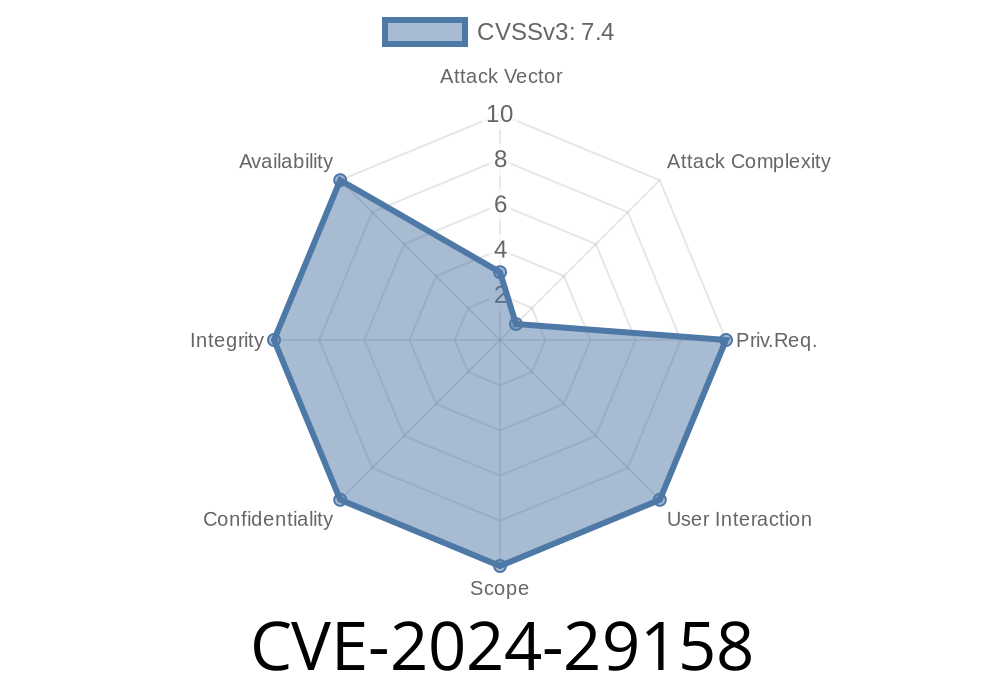A new vulnerability tracked as CVE-2024-29158 rocked the scientific and research software world in 2024. If your applications work with HDF5 files, or you’re a developer, pentester, or sysadmin concerned with binary data formats, this is a must-read.
Let’s break down, in plain American English, what’s going on with this vulnerability, why it matters, and how you can test it in action.
What is HDF5 and Why Should You Care?
HDF5 (Hierarchical Data Format version 5) is a widely-adopted library for managing large, complex datasets, used by NASA, CERN, universities, and countless research and analytics platforms.
HDF5 is written in C and works with lots of low-level memory management. Exactly the kind of thing prone to subtle bugs that sometimes lead to security issues…
The Vulnerability in Brief
CVE-2024-29158 is a stack buffer overflow in the H5FL_arr_malloc function of HDF5. From versions prior to 1.14.4 (including all up to 1.14.3), a caller can cause a buffer overflow, corrupting the instruction pointer (RIP on x86_64), and potentially leading to a Denial of Service (DoS) — or even remote code execution (RCE) in the worst case.
Attack vector: Malicious or malformed input (e.g., a crafted HDF5 file)
- Upstream fix: PR #2302 merged into main for HDF5 1.14.4
Official CVE Links
- NVD Entry for CVE-2024-29158
- HDF Group security page
Let’s look at a simplified version of the affected code
void *H5FL_arr_malloc(H5FL_arr_t *arr, size_t elem_count) {
/* ... */
char stack_buffer[256];
size_t needed = arr->elem_size * elem_count;
// Vulnerable line: No bounds check on 'needed'!
memcpy(stack_buffer, arr->data, needed);
/* ... */
// If 'needed' > 256, this overflows stack_buffer.
}
The function assumes elem_count is within reasonable bounds.
- An attacker supplying a HUGE element count (e.g., via a corrupted data file or packet), can make needed way bigger than 256.
Demonstration: Triggering CVE-2024-29158
Here’s a minimal (conceptual) example in C — the code below simulates the vulnerable behavior. _Do NOT run this on a production system_, just use it to understand how such a bug works.
#include <stdio.h>
#include <string.h>
struct fake_arr {
char data[1024];
size_t elem_size;
};
void vulnerable_malloc(struct fake_arr *arr, size_t elem_count) {
char stack_buf[256];
size_t needed = arr->elem_size * elem_count;
memcpy(stack_buf, arr->data, needed); // <-- Overflows if needed > 256
printf("Copied %zu bytes\n", needed);
}
int main() {
struct fake_arr arr = { .elem_size = 8 };
// Fill 'arr.data' with attacker-controlled pattern (for PoC)
memset(arr.data, 'A', sizeof(arr.data));
// Trigger overflow — pass a huge elem_count
vulnerable_malloc(&arr, 500); // 8*500 = 400 -> overflows by 3744 bytes!
return ;
}
If you run this under ASAN or Valgrind, you will see a stack buffer overflow warning.
Real-world exploit chain
- A malicious HDF5 file is created where certain fields are set to huge values, triggering the same unchecked multiplication inside the reader.
When your app reads the file (with a vulnerable HDF5 version), the corruption takes place.
- If attacker’s data is chosen carefully, they might even redirect execution (if mitigations like stack canaries aren’t present), or at least reliably crash your app (denial of service).
- You are at risk if
- Your application or service uses HDF5 <= 1.14.3 to parse untrusted HDF5 files (from users, public sources, etc).
- You are safer if
- You upgraded to 1.14.4 (get it here)
- Your environment runs with stack protections (ASLR, stack canaries) — but don’t rely solely on these!
How To Fix CVE-2024-29158
1. Upgrade HDF5 to 1.14.4 or later (Download and Changelog)
Never trust input files, even for scientific analysis tools.
3. If upgrading isn’t possible immediately, restrict who can upload/provide HDF5 files, and run your tools in a sandbox.
Resources & References
- HDF5 Security Report
- Github PR #2302 (the fix for this CVE)
- NVD CVE-2024-29158
- Community PoC/Walkthrough: huntr.dev report
TL;DR
CVE-2024-29158 is serious for any science or analytics software using HDF5. It’s exploited by sending a malformed file that triggers a buffer overflow, possibly allowing code execution.
Patch your software, sanitize and check your data, and treat every new file as suspect until you know better.
Keep your science safe!
*This article is exclusive and created for educational/awareness purposes. Don’t attempt unauthorized exploitation of production systems.*
Timeline
Published on: 05/14/2024 15:15:31 UTC
Last modified on: 07/03/2024 01:52:08 UTC
